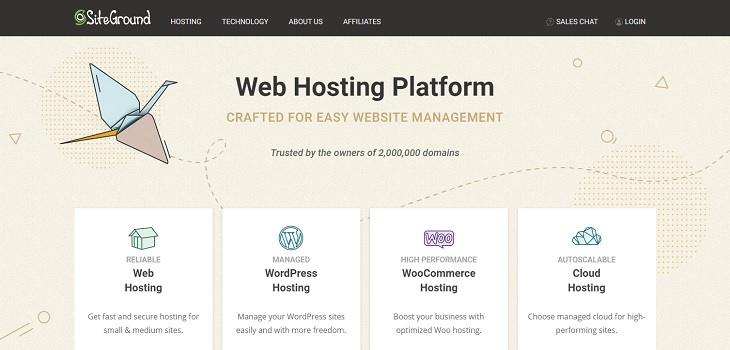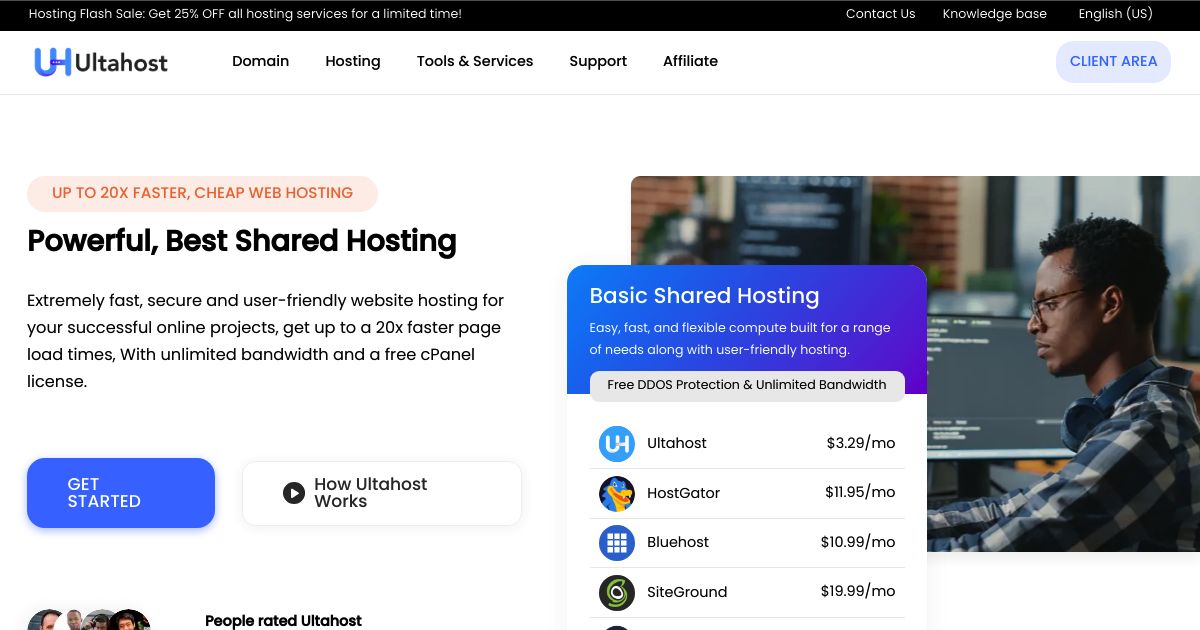SiteGround vs HostGator aren’t two brands that you commonly would associate with each other. In the past, this has been due mostly to discrepancies in their product profile. Today that gap has only grown further as SiteGround shifts even more sharply away from the budget hosting space.
[ninja_tables id=”5169″]
1. Company Background

[fonticon icon=”fa-globe”/] Website: https://www.siteground.com
Founded in Bulgaria around 15 years ago, SiteGround today has grown into a multinational beast. It boasts service to more than two million domains and offers everything from shared hosting to enterprise-class products. Over the past few years, growth has only accelerated and it now has a presence in the US, UK, Bulgaria, and Spain.
Read our SiteGround review to find out more.
[show_hostscore brand=”siteground” /]
[btn text=”Visit SiteGround” url=”/go/siteground”]

[fonticon icon=”fa-globe”/] Website: https://www.hostgator.com/
HostGator is a very seasoned name in the web hosting industry having been around for more than twenty years. It grew quickly from its early days and was originally an icon of budget hosting that eventually offered unmetered resources for web hosting. Today it’s been taken over by Endurance International Group (EIG) and joins the rest of its web hosting stable of companies.
Read our HostGator review to learn more.
[show_hostscore brand=”hostgator” /]
[btn text=”Visit HostGator” url=”/go/hostgator”]
2. Hosting Performance
With a casual look at their server performance graphs, one might not be wrong in thinking the speeds of these two hosts are closely matched. However, if you dig a little deeper you will observe that SiteGround does offer a more consistent quality of performance throughout.
2a – Response speed
[response_chart brand=”siteground” type=”shared” title=”SiteGround Server Performance” id=”siteground-1″/]
Over the past 30 days SiteGround performance has been good, but somehow lacking the zest that it once displayed. Recently observed average web server response speeds of SiteGround shared hosting servers clocked in at 145.73ms.
While these numbers may seem to be still acceptable, remember that this is a host that’s renowned for its performance. Taking that into perspective, it’s a bit difficult to swallow at this point of time.
There is also a rather wide discrepancy in performance numbers depending on point of test, with spikes at some points indicating a lack of stability in performance.
[response_chart brand=”hostgator” type=”shared” title=”HostGator Server Performance” id=”hostgator-1″/]
In recent numbers, HostGator hasn’t shown its best either, but for a budget host like this, it’s much more acceptable to see response speeds dip a little. Even more surprising is that its average response of 134.16 means it actually aggregates better than SiteGround.
Honestly speaking, when taken individually, both of these hosts offer speeds that are impressive. However, HostGator also has been showing much smoother performance levels than SiteGround at this point.
With only one drastic spike as an exception, the HostGator speed curve has been relatively good. This is surprising given the fact that SiteGround is running on Google Cloud servers even for its shared hosting.
2b – Server uptime
Common sense will typically tell you that individual servers will not be as reliable as Cloud-based options. However, over a 30-day period, we see a one-time dip from SiteGround, with none on HostGator.
[uptime_chart brand=”siteground” type=”shared” title=”SiteGround” id=”siteground-2″/]
[uptime_chart brand=”hostgator” type=”shared” title=”HostGator” id=”hostgator-2″/]
Even if there is a willingness to oversee the sudden uptime drop on SiteGround, one can’t help but to wonder what caused Cloud-based hosting, Google Cloud no less, to cut in this manner.
[fonticon icon=”fa-lightbulb-o”/] Our Verdict: Tie
3. Customer Support
SiteGround Support
SiteGround has always had a reputation for having a customer support team that goes far above and beyond to support its clients. This has not changed over the years and has become so much of a selling point that many customers swear by them.
Apologies for the inconvenience. We see that there is a ticket open regarding the case that our advanced technical team is working on. Please allow them some time to further investigate the case and assist you. Your patience is appreciated.
— SiteGround (@SiteGround) September 25, 2020
We are sorry to hear about the issues you are having with our Captcha. In order to provide you with relevant assistance, it would be best to get in touch with us directly over our official support channels here: https://t.co/I0TbHqSCfH
— SiteGround (@SiteGround) September 22, 2020
Such a reputation can only be founded in fact and is not an easy one to build and maintain. This makes them a very difficult web host to beat in this respect, be it by HostGator or in fact, practically anyone else in the industry vertical.
You can get help on SiteGround via multiple channels including via knowledgebase, AI-driven chatbot, automated response solutions, live chat, phone, and of course, a ticketing system.
Even more important that this very impressive range of solutions is the speed with which the support team will respond. For those who are used to getting automated responders and waiting another day for them to get back to you – SiteGround’s speed will deeply impress you.
HostGator Support
Hi Marcelo we sure do have different ways you can pay. You can check it out here: https://t.co/yLhx8WijkT Feel free to contact Live Support chat, telephone or Skype for free, they can check it out for you in greater detail. – Tia
— HostGator Support (@HGSupport) September 26, 2020
Hey Sadiq! Have you tried running the site through a webpage analyzer to see what the issue may be? From there, if there’s anything you don’t understand, we can try to explain. If you have already done this, feel free to send a screenshot!
— HostGator Support (@HGSupport) September 28, 2020
https://t.co/fO1f94sbM9
In this regard, even though HostGator also offers relatively good support, it gets dwarfed in comparison to SiteGround. Still, for most users, what they have is typically sufficient and includes access to a self-help knowledge base which is very useful and comprehensive.
On HostGator you can also seek assistance through Live Chat, Phone, or their Ticketing System. In terms of access, that’s still pretty much on a good level as per industry norms.
[fonticon icon=”fa-lightbulb-o”/] Our Verdict: SiteGround Wins
4. Resources and Features
On the surface it may not look like there are many differences between what SiteGround and HostGator have to offer. That is, if you’re looking towards the regular things that most web hosting hunters keep an eye out for.
Let’s look at what each has that the other omits;
SiteGround
- Better choice of server location
- Access to Weebly website builder
- Self-restore for backups
- Cloud-based shared hosting
HostGator
- Free site migration (even of moving to another HostGator server)
- Free domain name with all plans
- More developer-friendly tools
- Unmetered resources
The devil is in the detail and the dew distinctions that SiteGround has over HostGator are actually rather significant. Even the inclusion of a self-restore system for backups can mean a whole world of difference for users.
[fonticon icon=”fa-lightbulb-o”/] Our Verdict: SiteGround Wins
5. Specialized Hosting Plans
There is no doubt that in terms of specialized hosting plans, SiteGround comes out far ahead of HostGator. Instead of simply slapping on “WordPress hosting†to shared plans, SiteGround has custom built two special categories of plans that are actually useful.
Their WordPress plans are based on managed hosting, which is especially helpful for those who are focusing on commercialized WordPress sites. This helps take the strain of technical maintenance off business owners.
The same can be said for SiteGround’s WooCommerce plans which are also based on managed services for the same reason. Although HostGator does have a special category of plan for WordPress users, it has nothing that meets this level of focus.
Of course, at the upper end of the scale, both SiteGround and HostGator do offer enterprise scale plans. Even here though I would tip my hat to SiteGround for going with Google Cloud services.
Because of that, SiteGround has also foregone the traditional VPS category and gone straight into offering Cloud hosting. These are on the mid to higher end of the scale and not for entry-level users.
[fonticon icon=”fa-lightbulb-o”/] Our Verdict: SiteGround Wins
6. Pricing and Plans
6a- Shared Hosting
[plan_and_pricing brand=”SiteGround” type=”shared” title=”SiteGround Shared Plans”/]
[plan_and_pricing brand=”HostGator” type=”shared” title=”HostGator Shared Plans”/]
6b- VPS Hosting
[plan_and_pricing brand=”SiteGround” type=”vps” title=”SiteGround VPS Plans”/]
[plan_and_pricing brand=”HostGator” type=”vps” title=”HostGator VPS Plans”/]
As you can see, pricing is the one major weak point of SiteGround. With an entry price tag of $6.99, SiteGround has quite simply priced itself out of reach for the layman. While this may not be good news for some, there is reasoning behind the madness.
Web hosts that make their plans too affordable run the risk of having too many customers who may not even use their accounts much. Unfortunately, this can make it very difficult to judge exactly how many they can accommodate per server.
By pricing their shared plans high, SiteGround potentially avoids this issue and can offer the ones who do sign up with them decent levels of service.
There is another point of note though, and that is the sign up bonus. Many web hosts offer massive price cuts to encourage new users to join. The discount is generally applicable to whatever term of contract the user chooses. For SiteGround, their sign up discount is only applicable for the first year of the contract.
Unfortunately when it comes down to just dollars and cents, SiteGround simply can’t compete with HostGator.
[fonticon icon=”fa-lightbulb-o”/] Our Verdict: HostGator Wins
Conclusion: SiteGround or Hostgator?
Thanks to the different directions SiteGround and HostGator are hedging in, making a recommendation in their cases is relatively easy. My opinion would be along the lines of.
SiteGround is Recommended for…
Serious website owners who fully intend to grow and commercialize their sites. For you, performance and support is of prime importance and you simply can’t go wrong with SiteGround.
HostGator is Recommended for…
For those who want a basic solution that’s reputable and has shown decent stats, HostGator is a nominal choice. It’s attractive pricing and potential for scalability makes it good for almost any category of usage.
Final Thoughts
Even though SiteGround may seem technically to be a solid choice, consider your use case before buying in. High pricing and great support may not always be necessary and if you can live with HostGator, why pay the extra fees



